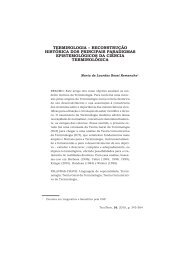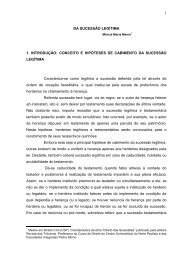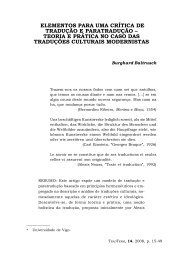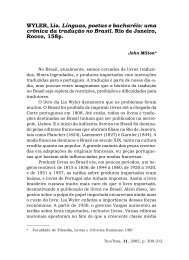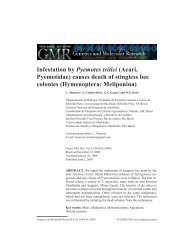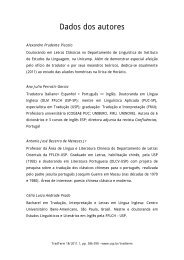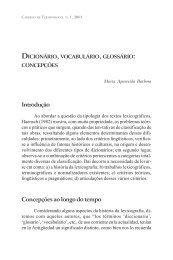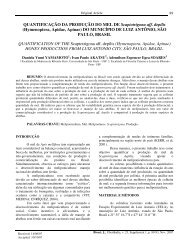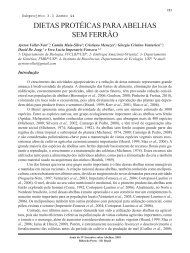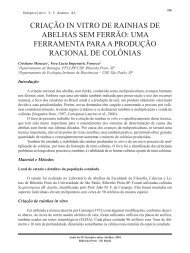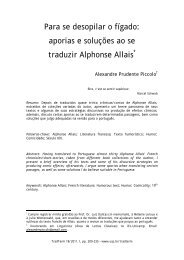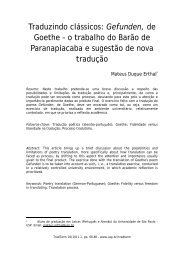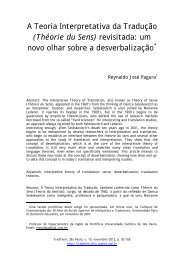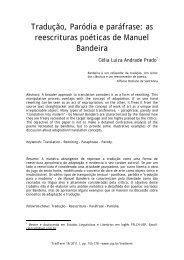Bees as pollinators in Brazil - USP
Bees as pollinators in Brazil - USP
Bees as pollinators in Brazil - USP
Create successful ePaper yourself
Turn your PDF publications into a flip-book with our unique Google optimized e-Paper software.
to place them. Agricultural extension does not<br />
currently tra<strong>in</strong> farmers about ways to manage<br />
their crops for maximum poll<strong>in</strong>ation.<br />
Extension services need to develop courses<br />
and educational material. They should develop<br />
c<strong>as</strong>e studies <strong>in</strong> cooperation with local<br />
growers (on-farm experiments).<br />
Consumers are not aware of how to<br />
select good quality (well poll<strong>in</strong>ated)<br />
fruits and vegetables<br />
Demonstration materials should be developed<br />
to help the consumer recognize and choose<br />
good quality products. Fruits and vegetables,<br />
such <strong>as</strong> melons, watermelons, apples and<br />
cucumbers, often have fewer than normal<br />
seeds, which results <strong>in</strong> <strong>in</strong>ferior products with a<br />
bad t<strong>as</strong>te. Such an awareness and educational<br />
programs will create a more sophisticated consumer<br />
and will encourage growers to use bees<br />
to produce high quality fruit.<br />
Other problems:<br />
• beekeepers generally are not concerned<br />
about determ<strong>in</strong><strong>in</strong>g the poll<strong>in</strong>at<strong>in</strong>g efficiency<br />
of their colonies, but are only try<strong>in</strong>g to produce<br />
the largest possible amount of honey;<br />
• beekeepers do not know how to stimulate<br />
the bees to collect pollen, which <strong>in</strong>cre<strong>as</strong>e<br />
poll<strong>in</strong>ation efficiency, <strong>in</strong>stead of nectar;<br />
• beekeepers do not know how to direct bees<br />
to a crop that needs poll<strong>in</strong>ation;<br />
• beekeepers distribute their beehives <strong>in</strong> a manner<br />
that is convenient for management, without<br />
concern or knowledge about the most<br />
efficient arrangement to facilitate poll<strong>in</strong>ation;<br />
• beekeepers manage their bees only for<br />
honey production because the farmers normally<br />
do not pay for poll<strong>in</strong>ation services;<br />
• we do not know the support capacity of<br />
agricultural are<strong>as</strong> for honey bee colonies or<br />
how many honey bee colonies can be<br />
placed <strong>in</strong> a specific area.<br />
Rear<strong>in</strong>g and management<br />
of Africanized honey bees<br />
<strong>in</strong> greenhouses<br />
Current problems:<br />
• lack of knowledge of the m<strong>in</strong>imum requirements<br />
necessary to use Africanized bees <strong>in</strong><br />
greenhouses (size of the colony, best time to<br />
<strong>in</strong>troduce the bees to the crop, culture<br />
specifics and management techniques);<br />
• misconceptions about Africanized bees <strong>as</strong><br />
effective <strong>poll<strong>in</strong>ators</strong>;<br />
• aggressiveness of the bees;<br />
• lack of technical and practical experience.<br />
Proposals:<br />
Workshop I 69<br />
• make producers aware of the usefulness of<br />
honey bees for poll<strong>in</strong>at<strong>in</strong>g <strong>in</strong> green houses;<br />
• <strong>in</strong>form public and private agencies <strong>in</strong>volved<br />
<strong>in</strong> rural extension, technical <strong>as</strong>sistance and<br />
promotion;<br />
• encourage research <strong>in</strong>stitutions to make<br />
studies on this subject, through specific<br />
guidel<strong>in</strong>es and f<strong>in</strong>anc<strong>in</strong>g;<br />
• develop <strong>in</strong>formative material, <strong>as</strong> a tool to<br />
encourage <strong>in</strong>cre<strong>as</strong>ed use of honey bees <strong>in</strong><br />
greenhouses, <strong>in</strong>form<strong>in</strong>g about successful<br />
experiences <strong>in</strong> <strong>Brazil</strong> and from other parts<br />
of the world, and by exam<strong>in</strong><strong>in</strong>g economic<br />
criteria;<br />
• develop <strong>in</strong>centives for us<strong>in</strong>g honey bees <strong>as</strong><br />
<strong>poll<strong>in</strong>ators</strong> <strong>in</strong> greenhouses and reduc<strong>in</strong>g the<br />
use of pesticides (tax deductions, low <strong>in</strong>terest<br />
loans, etc.);<br />
• publicity campaigns <strong>in</strong>form<strong>in</strong>g about the<br />
better quality of well-poll<strong>in</strong>ated fruits and<br />
vegetables, uncontam<strong>in</strong>ated by pesticides;<br />
• encourage and make available techniques<br />
for produc<strong>in</strong>g food <strong>in</strong> greenhouses;<br />
• capacitate technicians <strong>in</strong>volved <strong>in</strong> extension<br />
and who <strong>as</strong>sist farmers so that they can<br />
help them use honey bees <strong>as</strong> <strong>poll<strong>in</strong>ators</strong> <strong>in</strong><br />
greenhouses.



